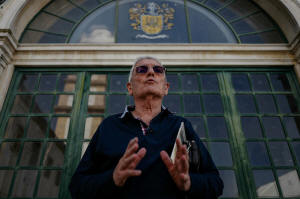Portugal celebrates democracy anniversary amid far-right surge
 Send a link to a friend
Send a link to a friend
 [April 24, 2024]
By Catarina Demony and Miguel Pereira [April 24, 2024]
By Catarina Demony and Miguel Pereira
SANTAREM, Portugal (Reuters) - Veteran military officer Captain Joaquim
Correia Bernardo, 84, remembers the revolution that toppled Portugal's
fascist dictatorship five decades ago as if it were yesterday.
He was in his thirties when he helped organize the April 25, 1974
military coup that returned Portugal to democracy after 48 years of
authoritarian rule.
In the city of Santarem, as he stood next to the statue of Salgueiro
Maia, an army captain who played a crucial role in the revolution,
Correia Bernardo said its values, such as democratic participation and
respect for one another, must be upheld.
"Freedom cannot be lost," he said.
His words have a particular resonance as the far-right is on the march
again in Portugal.
It was from a military base in Santarem that a column of vehicles left
to head to the capital Lisbon in 1974. Correia Bernardo stayed behind as
it was his duty to put into action a "Plan B" in case the coup did not
go as planned.
The almost bloodless coup was successful, becoming known as the
"Carnation Revolution" because soldiers placed blossoms in the barrels
of their guns.
It also led to the collapse of Portuguese colonial rule overseas,
notably in Africa, where wars against national liberation movements had
exhausted the military and drained state coffers.
But now, as the Portuguese prepare to celebrate the 50th anniversary of
the end of the dictatorship, with thousands expected to gather in the
streets, the far-right is rebounding following a general election last
month.
Founded in 2019, the anti-immigration, populist Chega, led by a former
sports commentator known for his derogatory remarks against ethnic
minorities, is now the third-largest political party in Portugal.

Correia Bernardo and academics say Chega's growth was due to a
perception that mainstream politicians have failed to meet citizens'
needs. Some of the ideals of the ousted regime have persisted and
Chega's leader Andre Ventura has adopted a narrative that allowed him to
garner support, they say.
Chega quadrupled its parliamentary representation to 50 lawmakers out of
230 seats in last month's election. The centre-right Democratic Alliance
won by a slim margin and is governing without an outright majority, with
Ventura warning of instability if the government does not to negotiate
policies with his party.
[to top of second column]
|

Colonel Correia Bernardo, one of Portugal's Carnation Revolution
militaries named "April Captains", gestures in front of a door of
the former Practical Cavalry School in Santarem, from where
militaries left towards Lisbon in April 1974 to overthrow Marcelo
Caetano's dictatorship, in Portugal, April 15, 2024. REUTERS/Pedro
Nunes

'CRY OF REVOLT'
Correia Bernardo said failures by consecutive governments to tackle
social discontent over issues such as a housing crisis and low
salaries fuelled Chega's rise. A vote for Chega was likely a "cry of
revolt," he said.
A study published on Friday by Lisbon's Institute of Social Sciences
ICS and research university ISCTE showed 34% of respondents believed
the housing situation was worse now than before the revolution and
42% thought the job market had deteriorated.
Around 66% also said corruption was more rife now, a scourge Chega
promised to stamp out.
More than half do not want another authoritarian regime but 23% said
that if current political leaders followed the "ideals" of former
dictator Antonio de Oliveira Salazar, who ruled for nearly 40 years,
Portugal might "regain its greatness".
"A narrative that was created during the regime resisted the April
25 (revolution) and persists 50 years later," ICS' Filipa Madeira,
one of the authors of the study, said.
University of Oxford political scientist Vicente Valentim, who has
written a book on the far-right, said that some voted for Chega
because they felt "left behind" but that many already shared the
party's ideology, such as racist and xenophobic views.
For a long time, there was no politician perceived as electable to
lead the far-right but Ventura changed that, Valentim said.
"Portugal was the country that seemed immune to the radical right
and suddenly all of that changed," Valentim said. "It is important
to understand what happened because you cannot combat a phenomenon
without understanding its causes."
(Reporting by Catarina Demony, Miguel Pereira and Pedro Nunes;
Editing by Aislinn Laing and Angus MacSwan)
[© 2024 Thomson Reuters. All rights reserved.]This material
may not be published, broadcast, rewritten or redistributed.
Thompson Reuters is solely responsible for this content. |